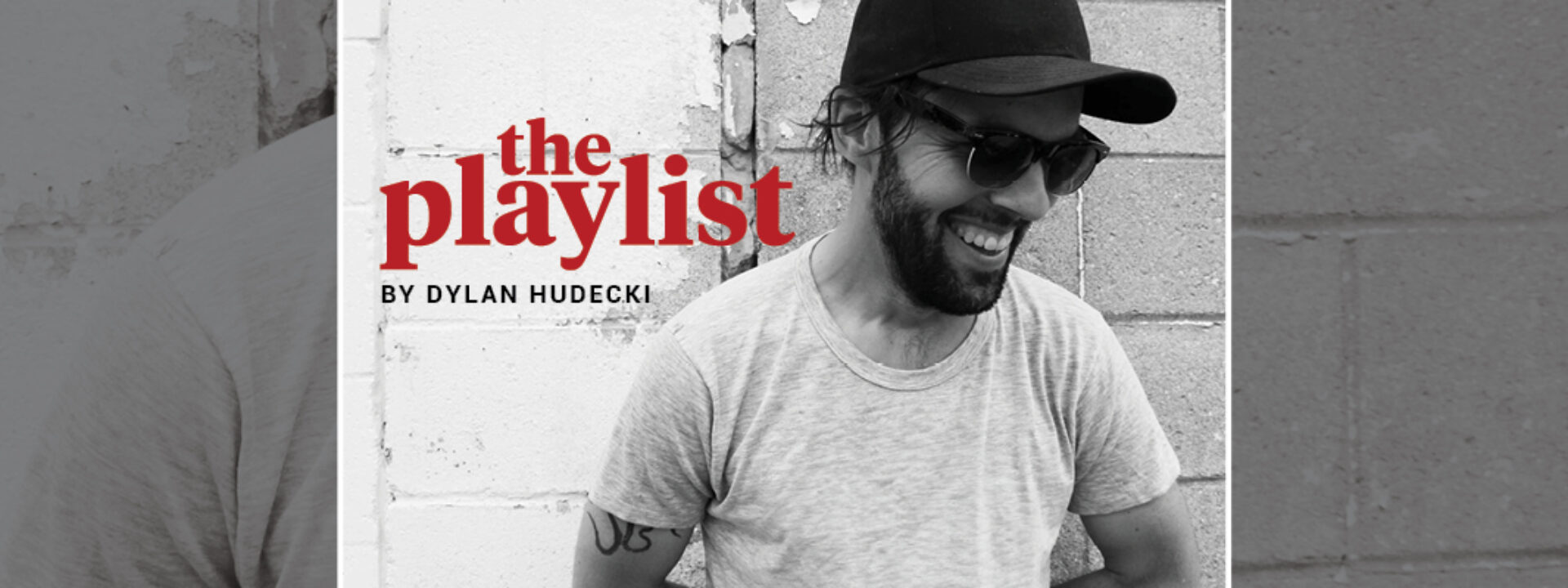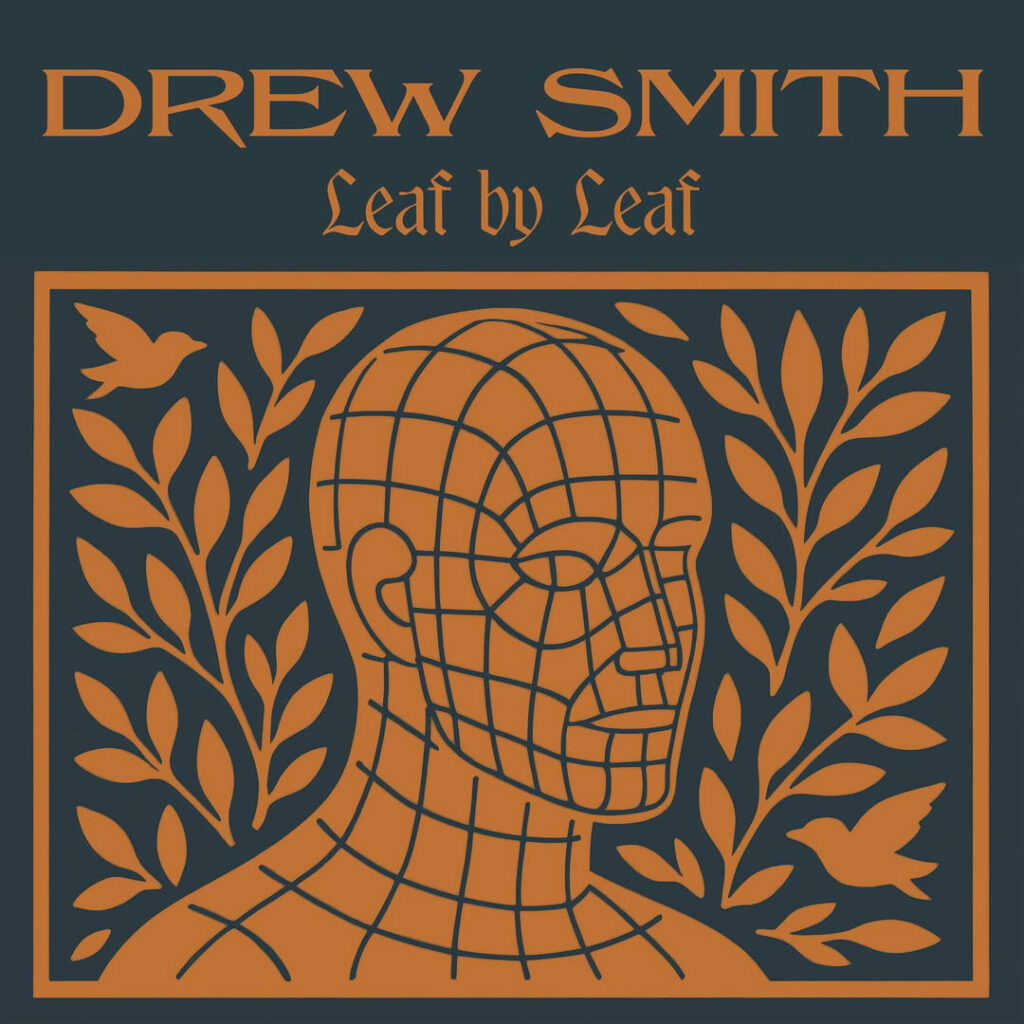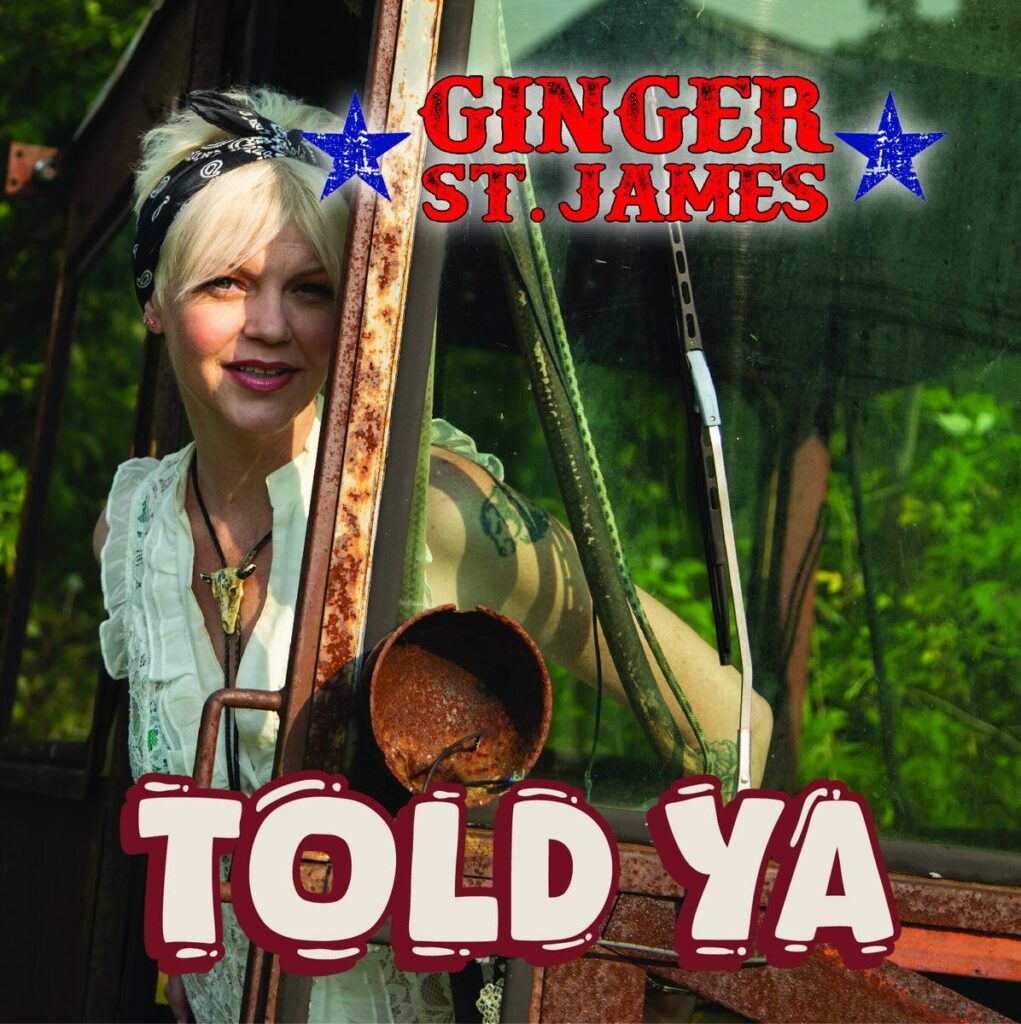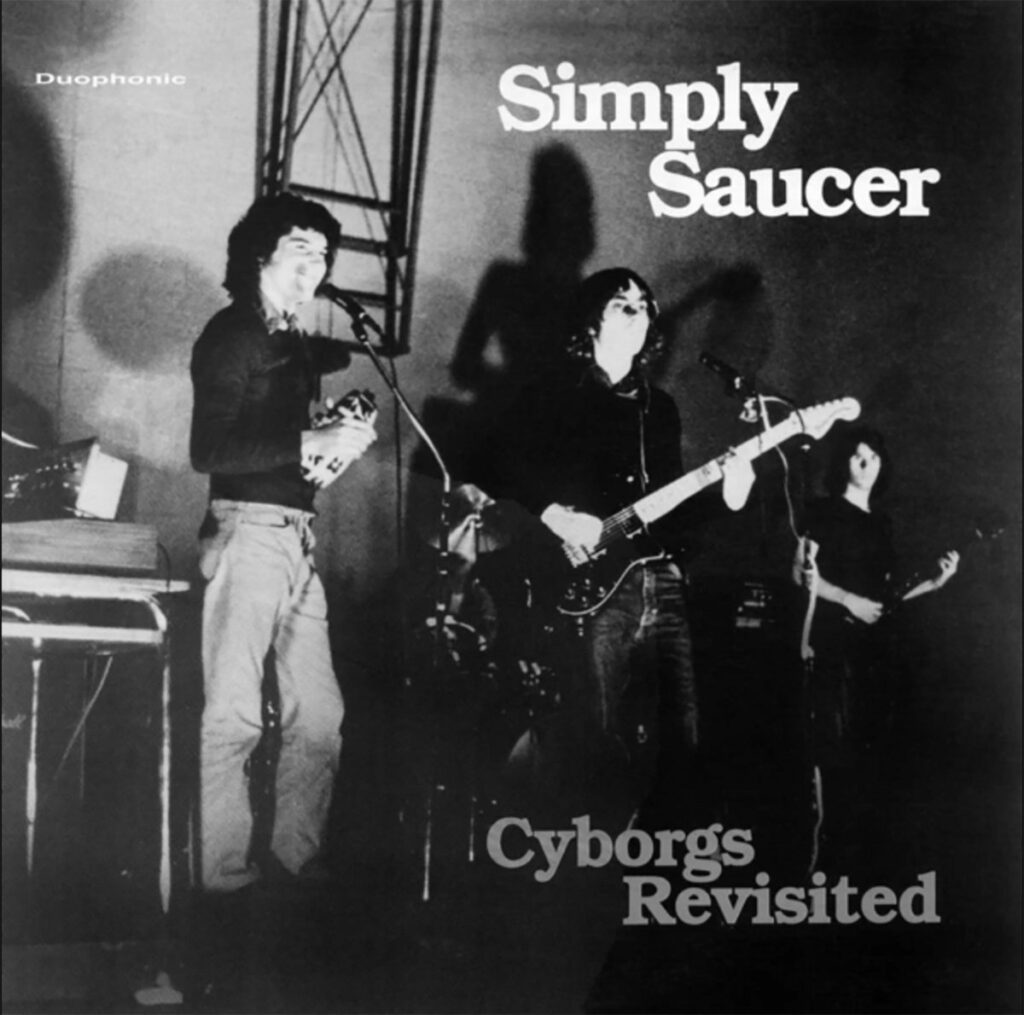THE PLAYLIST

Dylan Hudecki is a Canadian indie-rock vet having played in many different bands, including By Divine Right, Cowlick, Slow Beach and The Dill. He’s a proud Hamiltonian who covers local album releases for HAMILTON CITY Magazine.
Drew Smith – Leaf by Leaf

After more than a decade out of the spotlight, Hamilton singer-songwriter Drew Smith returns with Leaf by Leaf, a gorgeously composed and emotionally layered album that marks a graceful evolution in his songwriting. Thirteen years after his last full-length album, The Secret Languages, Smith sounds not only rejuvenated, but more focused and intentional than ever, delivering one of his most quietly powerful releases to date.
From the very first notes of opener “One Step Back,” it’s clear that Leaf by Leaf is no typical comeback. A sparse, Dr. Dre-esque piano line sets the tone before giving way to a hypnotic swirl of laid back funk-folk textures that pulse with quiet intensity. It's a bold move for Smith. This balancing act defines the album: combining ambient electronics with folk sincerity, pop melodies with classic songwriting structure, modern production with vintage soul.
Smith has always had a knack for melody, and for proof, his songs have appeared in films like The Stepfather and The Roommate, and TV dramas like Shark. However, Leaf by Leaf brings a new kind of depth to his work. The songs here are products of the past decade, written with care and patience, and produced in Cambridge, Ont. with longtime collaborator Andy Magoffin (Great Lake Swimmers, By Divine Right, The Constantines). Together, they’ve crafted a sound that is sweet, sincere, reflective, but ultimately forward-moving.
The album shines brightest when it leans into emotional vulnerability. “Keep Holding On” and “Open Up Your Love” wrap Smith’s falsetto in warm analog tones, while “There You Go” strips things back to something more raw and orchestral. The title track, “Leaf by Leaf,” is a delicate meditation that builds gradually, like watching spring unfold in slow motion. Smith's acoustic fingerpicking and soft vocals recall the gentle precision of Nick Drake or Fleetwood Mac at their most introspective and enchanting.
A standout is “Don’t Know What It’s Like,” inspired by the direct songwriting of Motown legends Holland-Dozier-Holland. Another highlight, “Don’t Lose Yourself,” explores the fragile line between self-preservation and surrender, buoyed by subtle Magoffin horn arrangements and a perfectly restrained rhythm section.
Though he cites influences ranging from Gershwin and Berlin to Motown and ambient indie contemporaries, Smith has carved a space that is entirely his own, showing off his mature lyrical and wise production touches. “This album means a lot to me on many personal levels,” Smith says, “but I hope that the songs can also mean something to someone else out there as well.”
That intimacy is palpable throughout Leaf by Leaf. It’s not just a document of beautiful melodies – it’s a map of a decade’s worth of thoughts, changes, ups and downs and everything in between. Whether you’re new to Drew Smith or have been waiting since Fossils, this record is a welcome, resonant return from a songwriter who still has plenty to say.
RIYL: Andrew Bird, Patrick Watson, Bon Iver, Lief Vollebekk, Daniel Caesar, Fleet Foxes, Chet Faker.
Drones Over Dufferin – Aural Obscura Vol. I, II, III

Drones Over Dufferin – a Hamilton-based ambient instrumental project led by brothers Duncan and David MacKinnon – has quietly delivered one of the most immersive ambient trilogies in recent memory with Aural Obscura Vol. I, II, III. Recorded live off the floor in four intimate sessions in Hamilton’s North End, these volumes aren’t simply ambient – they’re supra-ambient. If “ethereal” feels too tethered to earth, “supathereal” is more apt. This is music that exists outside of gravity.
At the heart of Aural Obscura are just two instruments: electric guitar and electric pedal steel. But in the MacKinnons' hands, these tools become vessels of vast emotional and sonic possibility. Real-time pedal looping – both digital and reel-to-reel – adds depth and temporal fluidity, turning every phrase into a ripple that echoes across imagined landscapes.
Tracks like “Rosy Fingered Dawn” and “Crown Shyness” unfold like slow dreams, with the pedal steel offering endless glissandi and aching vibrato – tones that mimic the human voice but sound beamed in from another realm. “Path of Totality” and “Imposter Syndrome” lives up to its name with a slow eclipse of mood, balancing tension and release with masterful restraint. “Sunrise Port Sydney” feels like morning arriving in slow motion, notes blooming open like light through the fog of Mary Lake.
Duncan MacKinnon’s use of pedal steel is a type of music therapy. Traditionally grounded in country and Hawaiian music, here it becomes something else entirely: a textural compass, a voice of weightless melancholy. In this regard, Drones Over Dufferin aligns with a small but vital lineage of ambient pedal steel visionaries: Chuck Johnson, Heather Leigh, Geir Sundstøl, and of course, Daniel Lanois – another North End Hamilton son whose soul seems to hover just beneath the surface of these recordings.
Engineered and mixed with clarity and subtlety by brother David MacKinnon, (who made a name for himself in Toronto in the early 00s with his spectacular junk-folk acclaimed staple Fembots), and mastered by Andy Magoffin at the House of Miracles, Aural Obscura 1, 2, and 3 is an offering of patience, space, and sonic reverence. There’s no rush here, no climax or chorus – only an invitation to float.
This trilogy is not background music. It’s background space. Or maybe foreground mood depending on your preference. Either way, the Aural Obscura trilogy is one of the most captivating and human-sounding ambient journeys to come out of Canada in years – and proof that even with just two instruments, you can build an entire cosmos.
RIYL: Daniel Lanois, Brian Eno, SUSS, Chuck Johnson, Fembots
Ginger St. James – Told Ya

There’s something about sweaty rockabilly out of Hamilton that just feels right – and nobody presently captures that gritty, gutsy spirit quite like Ginger St. James. On her fourth full-length release Told Ya, the flamboyant firecracker of Canada’s roots scene delivers a raucous, full-bodied record steeped in country soul, bar-room blues, and revved-up rockabilly swagger.
Right from the jump, St. James proves she isn't here to play nice or play small. This is a record that comes out swinging and doesn't let up. Whether she’s hollering over a twang-soaked riff or laying down heartache like a shot of bottom-shelf bourbon, she does it all with confidence, wit, and a voice that could rattle the rafters of any honky tonk.
Opener “Not Round Here” kicks things off with a sly wink and a punchy, up-tempo groove that sets the tone for what’s to come – hook-laden songs built for late-night dancing and storytelling under neon lights. “Lowdown Lonesome Blues” leans into the country side of her personality with a tear-in-your-beer lament that shows off her ability to channel vulnerability without losing any edge.
“Honky Tonk Hangover” is a stomping bar-room banger you can practically smell the whiskey on, while “Night Terrors” takes a darker turn – slow-burning and eerie, it proves St. James can deliver depth as well as heat. But it’s “Soul Shack” that might be the record’s heart. Written on the back of a bill during pandemic despair, the song radiates warmth and hope, an ode to finding your tribe in the chaos. A soul and R&B track that even includes a group of ’50s Doo-wop backup singers to round out the Tina Turner tone.
Her band, featuring local heavy-hitters Chris Altmann, Greg Brisco, Max Wray, and longtime partner-in-crime Snowheel Slim, plays like they’ve been raised on Sun Records and seasoned on stages across every dive bar and dance hall in Ontario. Together, they bring a tight but loose energy that captures the wild spirit of St. James’ legendary live shows.
Told Ya isn’t just a collection of songs, it’s a full-throttle experience. It’s the sound of someone who knows exactly who they are and isn’t afraid to shout it. St. James doesn’t chase trends or soften her edges. She writes what she lives, sings like she means it, and throws down like it’s the last night on earth. By the time the final track “Railway Rider” rolls around – dusty, defiant, and laced with wanderlust – you get the sense that Ginger St. James isn't just singing from the heart. She's shouting from the back of a flatbed, daring you to keep up.
Told Ya is raw, real, and unrepentantly alive. The real deal.
RIYL: Detroit Cobras, Holly Golightly, The Greenhornes, Whitehorse, The Dead Weather, Wanda Jackson
REVISIT ME
Not many publications have ever done retroactive reviews for albums that are fantastic and overlooked. Why not? Why does every single music review have to be for a brand new release or a reissue? Why do we have to wait until certain songs have made comebacks thanks to movies and TV shows – like Kate Bush’s “Running Up That Hill” in Stranger Things or Redbone’s “Come and Get Your Love” from Guardians of the Galaxy to remind us how good a song or album is? So at HCM we have an ongoing “Revisit Me” album In each edition where we spotlight a Hamilton release that’s so good it deserves another listen and spotlight shone again.
Simply Saucer – Cyborgs Revisited

If you’re late to the reissue party, don’t sweat it — Cyborgs Revisited by Simply Saucer is one of those rare records where the legend only grows with time. Hamilton has birthed some gnarly, iconic rock bands – Forgotten Rebels, Teenage Head, Junkhouse, Dirty Nil, Terra Lightfoot, Arkells – but Simply Saucer exists on a different plane entirely. Their 1989 archival release Cyborgs Revisited is as much a document of outsider genius as it is a portal into a lost Canadian proto-punk cosmos.
Originally recorded in 1974-75 and shelved for over a decade, Cyborgs Revisited combines an unreleased Daniel and Bob Lanois-produced demo and a raw rooftop concert at Jackson Square. At the time, the band had only released one single. No albums. No deals. Just a series of increasingly unhinged gigs and a body of work that somehow fused Velvet Underground, Can, Hawkwind, Stooges, Syd Barrett-era Pink Floyd and a heavy coat of Hamilton grime.
Frontman Edgar Breau led this mission with a vision that was simultaneously dystopian, glam, and deeply personal. Songs like “Illegal Bodies” and “Nazi Apocalypse” aren’t just catchy, they’re kaleidoscopic punk sermons. Breau’s Lou Reed-meets-Jonathan Richman drawl wraps around verses about metalloid enforcers, moonstones, and war crimes from Eva Braun’s perspective.
If Bowie was Jagger on Diamond Dogs, Breau is Lou Reed being Bowie being Jagger but never derivative, always just this side of delirium.
The band’s sonic architects were just as crucial. Neil DeMerchant’s drumming sounds like he built his kit out of nothing but snare drums. His rhythms rattle like a teenage band storming your basement. Bassist Kevin Christoff adds low end fuzzed-out propulsion, while Ping Romany (John LaPlante), Breau’s foster brother, brought the weird — Eno, Sun Ra, and Stockhausen all bleeding through his electronics like alien transmissions. Romany’s “electro-palette of sonic skree,” as critic Bruce Mowat called it, gives the songs an unhinged unpredictability that still sounds dangerous.
The sci-fried present “Electro Rock,” is a swirling Barrett-esque romp that lurches into a pop freakout before collapsing into absolute psychedelic chaos. “Bullet Proof Nothing” could’ve been a Velvet Underground/Iggy Pop hit anthem, with Breau pleading, “Treat me like dirt / I’m a point-blank target for your mindless abuse.” Sidenote, the track has the same two opening chords as The New Radicals hit “You Get you what Give.” Then there’s “Dance the Mutation,” a glorious Bowie-by-way-of-Stooges sex-stomp with a synth hook so infectious even the floor shakes. It's sleazy, glammy, and perfect.
But the band wasn't built for mainstream acceptance. Major labels ran the other way, and by 1975, Simply Saucer had imploded – a mix of poor timing, little support, and too much substance abuse. Cyborgs Revisited focuses on the 1974-75 core lineup at their peak, before they were scattered by industry indifference.
What’s wild about the release is the live songs added to the tail end of the album. Three album tracks roar out of the speakers with an even more noisy, live intensity. Thankfully, whoever recorded the concert knew what they were doing, so it rips! Would love to have been at that show. (Sidenote, this cult smash is further proof that the Jackson Square rooftop needs more properly put together and attended shows, forever). They ended the record with a “Sweet Jane/I’m Waiting for My Man” mashup/hot mess. So much feel and soul.
The indifference of the time makes the album’s eventual rediscovery all the more miraculous. Released in 1989 by Mole Records and Cargo, Cyborgs quickly earned cult status, hailed by Forced Exposure, PopMatters, Pitchfork, and Alternative Press. Chart Magazine ranked it among the best Canadian albums ever; Bob Mersereau placed it at #36 in his Top 100 Canadian albums.
Since reforming in 2006, Simply Saucer have enjoyed long-overdue accolades – including deluxe reissues, archival releases, and Jesse Locke’s definitive biography Heavy Metalloid Music. But Cyborgs Revisited remains the crown jewel: the sound of a band ahead of their time, mutating in real-time, blending the cerebral with the unhinged. Hamilton may have birthed a lot of greats, but Cyborgs Revisited is its secret weapon — a sci-fi punk document that transcends genre, era, and geography. You don’t listen to this record; you get abducted by it.
RIYL: Tom Verlaine, Iggy Pop, Stooges, MC5, Cindy Lee, Can, Sonic Youth, Velvet Underground














